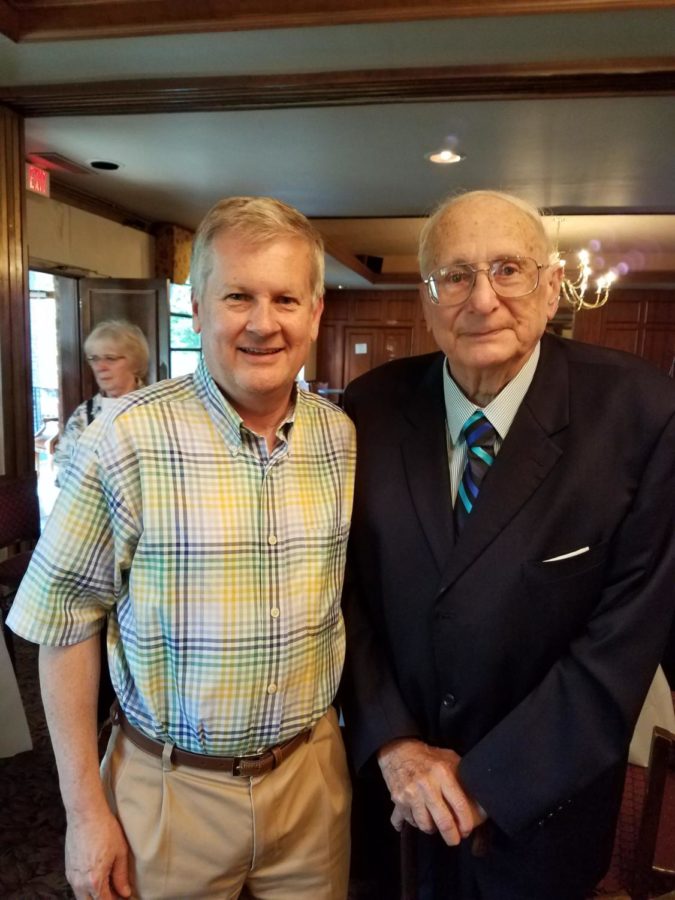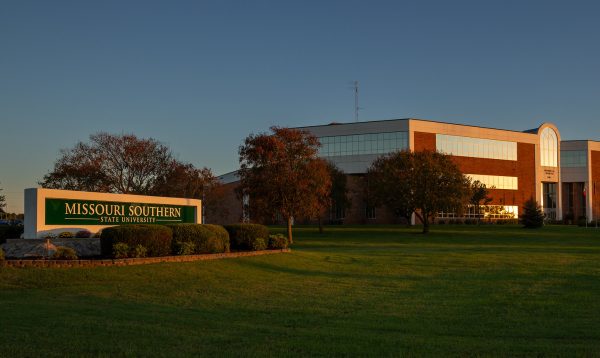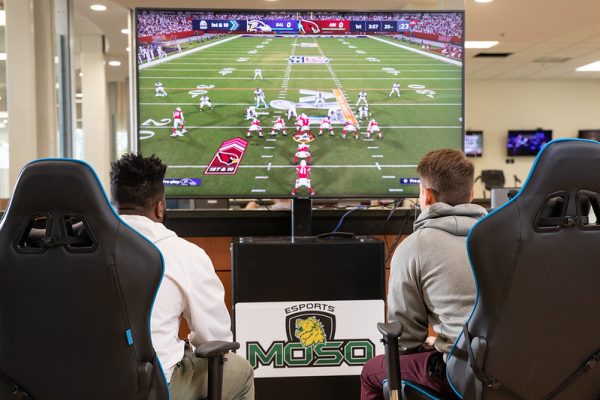Massa’s legacy at Southern
Dr. Chad Stebbins (left), Director of International Studies with Richard Massa at his 85th birthday in May of 2017.
Abby Prewitt article Victoria
Music and art play key roles in Prewitt’s life
Abbey Prewitt learns more about herself through playing music
Editor-in-chief
Scholar, storyteller, pioneer. Those are but a few of the labels given to Richard Massa concerning his impact at Missouri Southern.
A hardworking man with a vision and a passion for helping students, Massa’s role became evident in his influence within the communications department and Institute of International Studies at Southern.
Massa founded the communication department, as well as the television and radio stations. He was also advisor to The Chart and served as the first Director of the Institute of International Studies.
When Massa came to Southern in 1972, there were few journalism courses which – along with foreign language classes – were taught out of the English department.
“He saw a need for a separate department that would focus on journalism, on foreign languages, and other aspects of communication,” said Dr. Chad Stebbins, Massa’s former student, later colleague, and current director of the Institute of International Studies.
Massa established the communication department in 1980, creating a set of new courses and hiring faculty to teach. He also taught courses himself. The department’s first graduating class finished in 1983.
“The department was known for the many hands-on opportunities it provided students, first through The Chart, then through the television station and radio station,” Stebbins said.
During the time Massa was advisor to The Chart, he secured new equipment for the newsroom as well as recruiting new staff members.
Under Massa’s direction, Chart reporters grew a reputation for investigative reporting and became regarded as one of the finest college newspapers in the Midwest.
Massa believed it should be a professional newspaper in everything that was done, from its approach, to interviewing and its design.
Since putting out the paper was conducted differently without the modern day technology available, Massa would come in 6:30 a.m. to type student’s stories into the computer. As a morning person, he spent the early hours of the day to work, finding it easier when alone.
He even went as far as to take four members of the staff to Washington D.C. at his own expense, to cover Jimmy Carter’s presidential inauguration.
As an instructor, Massa’s favorite class to teach was Human Communication or Comm. 101.
“He tried to inspire his students to be bold, creative and imaginative,” Stebbins said. “He would frequently begin every semester by slapping the chalkboard really hard and shouting ‘Passion. You must have a passion for everything you do.’”
The creation of the Institute of International Studies is another example Massa’s work ethic and capacity for work.
The Institute was a vision of then University President Dr. Julio León, who asked Massa to spearhead its creation.
The two worked together on a University committee, León using his business experience and Massa focusing on marketing and publicity. Ultimately, the partnership led León to name Massa as the first the director of the new institute.
“When I asked him to be in charge of the Institute of International Studies, and to develop plans for it, I basically told him what I had in mind, and two days later, he came back to me and put on my desk 30 pages of plans that he had,” León said. “I’m sure that he worked all day, all night those two days to put that together. That’s what he was capable of, and that was shaped by his vision.”
The Institute is clearing house for international activities on campus, including opportunities to study abroad, yearly themed semester, internationalizing course curriculum, and outreach to community.
After creating the Institute of International studies, Massa, who was a seasoned traveler, traveled with Stebbins to several countries to develop international relationships with other universities.
The two traveled Austria, France, Germany, Ivory Coast, Senegal and Croatia, and many of the partnerships they established impact Southern today.
“I’m fortunate that I was his student and later his colleague and his friend,” Stebbins said. “and that I might have played a very small role in everything he accomplished at Missouri Southern.”
To León, Massa’s legacy is that he is part of a group of faculty that helped shape the future of Missouri Southern and made it into what it is today, an institution with an international mission.
“Primarily, when you think about the fact he was the advisor to The Chart, and he became head of the communications department, then with the creation of the radio station and the television station, that was the direction in which the [department] institution became fully immersed in communications as a degree-granting institution,” León said. “The proof is in the number of students who remember how important he was to their lives as professionals in the communications field.”
Every time León watches the television station or hears the radio station, he thinks of Massa since he was the person behind the development of the programs.
For Dr. Alan Marble, current University president, Massa’s establishment of the communication department and the level of excellence he achieved, permeates the whole campus.
He said Massa’s work at the Institute of International Studies, helped it become an integral part of the school.
“As a result, students are exposed to the world in a way they likely would have not experienced at any other university,” said Marble.
Even after retirement, Massa remained involved on Southern campus. He would visit, spend time as a guest lecturer, and often encourage students. He also donated funds to support the University.
“He was a man of great refinement and appreciated the arts and literature,” Marble said. “I always enjoyed conversations and discussions with Mr. Massa, about worlds events, politics, diplomacy, art and culture.”
Massa was a renaissance man, explained Marble. He was well informed on virtually all subjects which made him a treasure.
Massa’s personality as colleague was quiet, introspective and intelligent, as well as thoroughly academic, thoughtful and insightful.
“Often, we think about communication as the ability to speak or write and communicate, but another very important part of communications that Mr. Massa often referred to is listening,” Marble said. “One of the things that I’ll enjoy remembering is his acceptance speech when he received the Lion-Hearted Award, just last fall.”
Massa had the audience captivated, Marble said, experiencing a range of emotions. They were laughing one moment, tears in their eyes the next.
“He will be missed, but never forgotten,” Marble said.
The Institute is clearing house for international activities on campus, including opportunities to study abroad, yearly themed semester, internationalizing course curriculum, and outreach to community.
After creating the Institute of International studies, Massa, who was a seasoned traveler, traveled with Stebbins to several countries to develop international relationships with other universities.
The two traveled Austria, France, Germany, Ivory Coast, Senegal and Croatia, and many of the partnerships they established impact Southern today.
“I’m fortunate that I was his student and later his colleague and his friend,” Stebbins said. “and that I might have played a very small role in everything he accomplished at Missouri Southern.”
To León, Massa’s legacy is that he is part of a group of faculty that helped shape the future of Missouri Southern and made it into what it is today, an institution with an international mission.
“Primarily, when you think about the fact he was the advisor to The Chart, and he became head of the communications department, then with the creation of the radio station and the television station, that was the direction in which the [department] institution became fully immersed in communications as a degree-granting institution,” León said. “The proof is in the number of students who remember how important he was to their lives as professionals in the communications field.”
Every time León watches the television station or hears the radio station, he thinks of Massa since he was the person behind the development of the programs.
For Dr. Alan Marble, current University president, Massa’s establishment of the communication department and the level of excellence he achieved, permeates the whole campus.
He said Massa’s work at the Institute of International Studies, helped it become an integral part of the school.
“As a result, students are exposed to the world in a way they likely would have not experienced at any other university,” said Marble.
Even after retirement, Massa remained involved on Southern campus. He would visit, spend time as a guest lecturer, and often encourage students. He also donated funds to support the University.
“He was a man of great refinement and appreciated the arts and literature,” Marble said. “I always enjoyed conversations and discussions with Mr. Massa, about worlds events, politics, diplomacy, art and culture.”
Massa was a renaissance man, explained Marble. He was well informed on virtually all subjects which made him a treasure.
Massa’s personality as colleague was quiet, introspective and intelligent, as well as thoroughly academic, thoughtful and insightful.
“Often, we think about communication as the ability to speak or write and communicate, but another very important part of communications that Mr. Massa often referred to is listening,” Marble said. “One of the things that I’ll enjoy remembering is his acceptance speech when he received the Lion-Hearted Award, just last fall.”
Massa had the audience captivated, Marble said, experiencing a range of emotions. They were laughing one moment, tears in their eyes the next.
“He will be missed, but never forgotten,” Marble said.
Your donation will support the student journalists of Missouri Southern State University. Your contribution will allow us to purchase equipment and cover our annual website hosting costs.




















